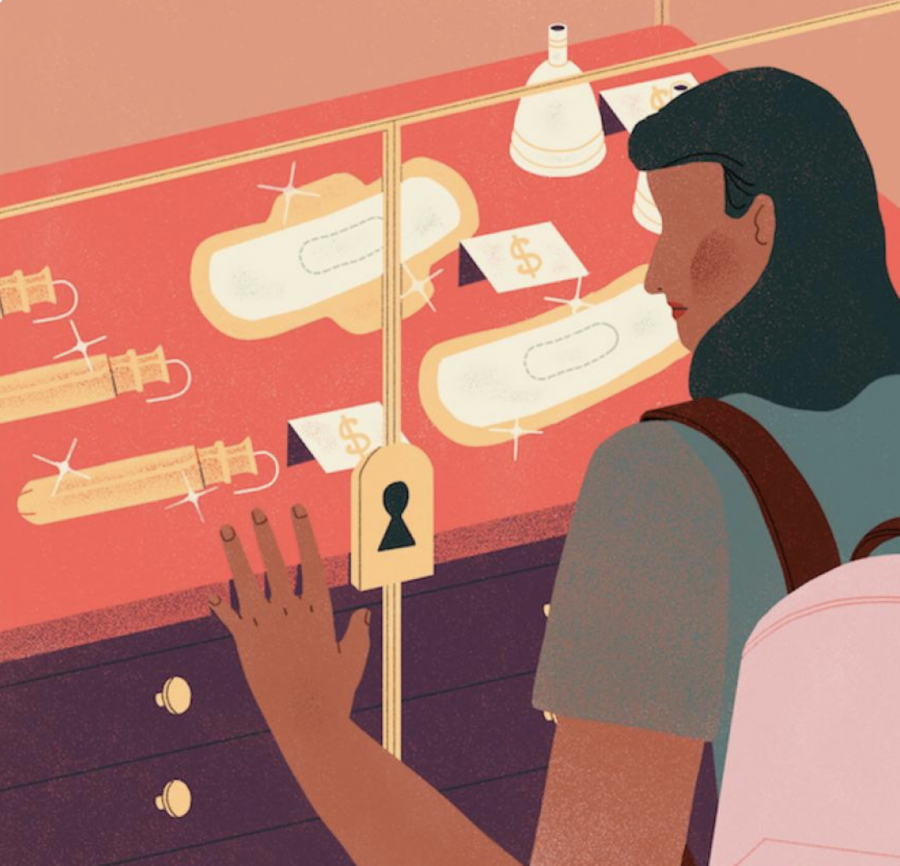Periods Don’t Stop For Pandemics
March 21, 2021
Whether it be through school closures, the banning of large crowds, or mandatory face coverings, COVID-19 has placed burdens on everyone’s shoulders. During this unprecedented pandemic, period poverty, or inadequate access to menstrual hygiene tools and education, has escalated dramatically and is a problem affecting millions of women across the globe. Restrictions and school closures have negatively impacted students who struggle for access to menstrual hygiene products. Previously, students have depended on teachers or school nurses for essential products like pads and tampons, but now, they have limited access to them or have even lost access completely. One in five American teens have struggled to afford period products, or haven’t been able to purchase them at all. This number has only gotten worse since the start of the pandemic.
Period poverty is not new. Menstrual hygiene products are not covered under national food stamps and are even taxed in 30 states. They are not seen as essential products, nor are they provided for free in public restrooms. Kerry Stahl, a high school teacher in Delaware, keeps a stash of tampons and pads—paid for by herself—in her classroom for her students to use. This eliminates the problem of students having to trek to the nurse’s office and miss out on valuable learning during class time. This way, students don’t need to worry about where they are going to get supplies from in a moment of emergency and can focus on what is truly important when they are at school. However, now that more and more kids are not able to attend school normally, this issue has only been exacerbated which left people who were already struggling at even more of a loss.
Fortunately, there are nonprofit organizations that are working to combat this issue. Days for Girls is a nonprofit dedicated to producing and distributing washable, sustainable menstrual pads, also known as DfG Kits, to women in over 144 countries around the world: “Volunteers in over 1,000 chapters and teams, together with local enterprise leaders, create kits for distribution to the most vulnerable, reaching over 1.8 million women and girls”. By encouraging community research and making use of social media, they continue to educate and change the lives of women every day. In addition, Days for Girls is one of the organizations that create COVID-19 infographics to inform people about menstrual hygiene and are distributed to a wide audience through their social media pages and partnerships with other organizations. Young girls who would otherwise not have been able to focus on their studies or afford hygiene products can now afford to do so.
Moreover, organizations and nonprofits that distribute menstrual hygiene supplies and push for legislative action have been seeing opportunities to help out in their communities. A leader at one organization called PERIOD had over 30,000 pads, tampons, and other menstrual products available for distribution as a result of donations from a holiday drive. With these, she was able to give out much-needed products to anyone who filled out a form on their organization’s website. Other organizations that distribute free supplies like I Support the Girls and No More Secrets have also seen as much as a 35% increase in requests for products. Since March 2020, I Support the Girls has collected and distributed over 2,000,000 products. These initiatives have all had a very positive impact on numerous lives.
Over the course of this pandemic, it has been made clear that menstrual products are a necessity, not a luxury. Period poverty does not just happen in other countries, but also in our own school. It is imperative that our government and our education systems understand the severity of this issue and the consequences it can have on young women. There are many ways that everyday people can support the cause, for example, by donating to the organizations mentioned above and simply spreading the word!
